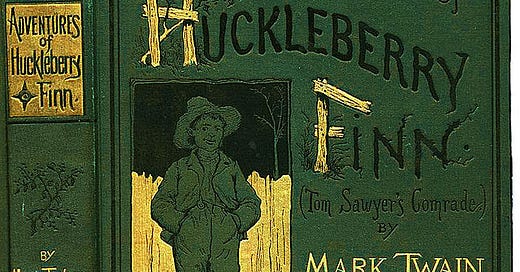Shakespeare wrote a play, titled, Alls Well That Ends Well. That was the phrase that popped into my head after I finished, The Adventures of Huckleberry Finn. Shucks, it’s been half a century since I read the book the first time around. During my university days. I read Tom Sawyer as a kid, traveling from New York City to Phoenix. The story was a great way to pass the time, in between seeing the sites.
Re-reading Huckleberry as a mature adult is quite the different experience. Now I look on those two adolescent boys, Huck and Tom, as real knuckleheads. And the runaway slave, Jim, as a true saint for putting up with them. For those of you who have not read both or either of these books, read them. They tell a far more interesting history than any history text book. Don’t let the brain dead woke, persuade you that these are evil books that should be banned. They need to be read, not only as a history, but to remind ourselves how dumb kids are.
Tom and Huck lie because they are young and stupid. And these two lie constantly.
Tom and Huck’s intent is noble; get the runaway slave, Jim, out of the South and into safety where he can be free. But these two, Huck and Tom, especially Tom, well they are over the top when it comes to weaving falsehoods. Sure, those lies make for a wild and crazy adventure. But you better have a great memory if you are lying.
Huck’s adventure begins with a lie. He becomes the go-between in a Romeo and Juliet scenario. This first lie is Miss Sophia sending Huck back to church to fetch her Bible she “forgot” and left behind on a pew. At the church, Huck leafs through the Bible to find a note. That note leads to all sorts of sorrows, and misadventures. People will die because of it. The second lie is one of omission; Huck tells no one that two people from feuding families are about to make a run for it.
Lying is original sin.
Once the feuding families get into it, and start killing, Huck escapes. He returns to the safety of the raft, and, with Jim, begins his trek down the great Mississippi River. That’s when we are introduced to the trickster characters, the King and the Duke. Liars extraordinaire. Here’s how Huck describes the situation:
It didn’t take me long to make up my mind that these liars warn’t no kings nor dukes at all, but just low-down humbugs and frauds. But I never said nothing, never let on; kept it to myself; it’s the best way; then you don’t have no quarrels, and don’t get into no trouble. If they wanted us to call them kings and dukes, I hadn’t no objections, ‘long as it would keep peace in the family;
The tricksters use Huck for their work of thievery. They nearly steal $6000 dollars, from three daughters of a man recently deceased. But Huck tells the eldest daughter the truth, and things right themselves. Eventually, the tricksters, in another town, are tarred and feathered, and run out of town. Finally, Huck is free of them, only to find himself caught up in another situation because before the two evil ones were caught, they had sold Jim for $40. So now Huck has to find Jim, and try to rescue him.
Jim is held captive on the farm of Tom Sawyers’ Aunt Sally. Huck is mistaken for Tom. He lies as he accepts the mistake. Fortunately, since Tom is his fast and thick friend, it’s a lie he can pull off, until Tom himself arrives. Tom goes along with the setup, and tells his Aunt Sally he is Tom’s older brother, Sid.
As you can see, it is down right Shakespearean, with all these mis and false identities. Talk about weaving a tangled web! It will end well, but oh the suffering and madness that ensues between Tom’s wild fantasies that he puts into action, and the farmers that show up to protect the family, 16 of them, with their rifles.
Tom gets shot in the melee of the chase to find the runaway Jim. It is this shot in the leg that leads to the recapture of Jim. And then Aunt Polly shows up to bring the story to a nice ending. And we find out that Jim was a free man all along. Well, it is a comedy, not a tragedy. And in comedy, we find just as much redemption, perhaps more, than in a tragedy.
Personally, I have a tremendous dislike of liars. For all the reasons mentioned in the story. Like the young Huck being pulled along by the Duke and the King, a liar can involve a body in unpleasantness. For there is no remedy in a lie, except to suffer. It is a tangled web, that catches the liar and everyone associated with him. Or her.
Lies are the root of chaos.
The suffering due to the lies is the point of the story, it is Twain’s theme. True, Huck has the noblest of intentions, when he works to set Jim free. But it is the truth that really sets Jim, and Huck, and everyone else, free. Tom, well, he’s a younger version of the King and the Duke, and if he doesn’t follow the guidance of the adults, he will end up just like them: A trickster that is always hustling others. At the end, he has to fess up that he knew, the moment he arrived, that Jim had been set free. He avoided the truth because he wanted to avoid growing up. His convoluted hero’s journey nearly got him killed.
The boys are adolescents, with a set of adults prepared to lead them to adulthood. So in this story, all is well that ends well
.




